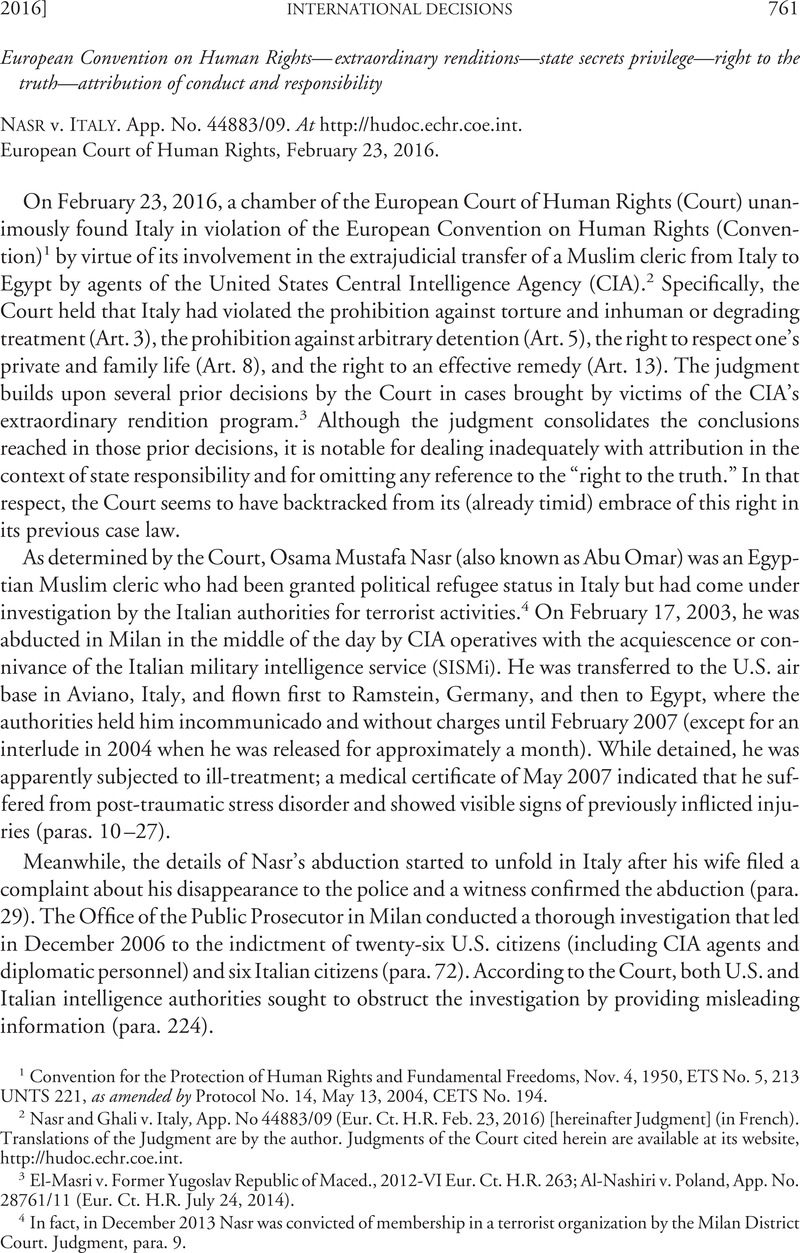No CrossRef data available.
Published online by Cambridge University Press: 29 March 2017

1 Convention for the Protection of Human Rights and Fundamental Freedoms, Nov. 4, 1950, ETS No. 5, 213 UNTS 221, as amended by Protocol No. 14, May 13, 2004, CETS No. 194.
2 Nasr and Ghali v. Italy, App. No 44883/09 (Eur. Ct. H.R. Feb. 23, 2016) [hereinafter Judgment] (in French). Translations of the Judgment are by the author. Judgments of the Court cited herein are available at its website, http://hudoc.echr.coe.int.
3 El-Masri v. Former Yugoslav Republic of Maced., 2012-VI Eur. Ct. H.R. 263; Al-Nashiri v. Poland, App. No. 28761/11 (Eur. Ct. H.R. July 24, 2014).
4 In fact, in December 2013 Nasr was convicted of membership in a terrorist organization by the Milan District Court. Judgment, para. 9.
5 In the original French version of the decision, the Court used the term “state secret privilege,” with “secret” in the singular.
6 See Corte cost., 10 febbraio 2014, n. 24; Corte cost., 11 marzo 2009, n. 106 [hereinafter No. 106/2009]. Both decisions are available at http://www.cortecostituzionale.it (in Italian and unofficial English translations).
7 None has been extradited so far to Italy from the United States. European arrest warrants against them have been circulated but to date none has been enforced. An international arrest warrant, which has not been enforced, was issued against Robert Lady, the CIA chief in Milan at that time. The president of Italy pardoned three of the convicted U.S. citizens. Judgment, paras. 146–50.
8 The factual background of the case does not corroborate the Court's use of the term “transfer” in this context, since Italy never took the victim into custody during the operation. This formulation probably resulted from reproduction of the relevant phrasing from the Court's two previous cases on extraordinary renditions.
9 The state secrets privilege is a procedural objection raised by the executive to “block discovery in a lawsuit of any information that, if disclosed, would adversely affect national security.” Ellsberg v. Mitchell, 709 F.2d 51, 56 (D.C. Cir. 1983).
10 See, e.g., Mohamed v. Jeppesen Dataplan, Inc., 614 F.3d 1070, 1087 (9th Cir. 2010); El-Masri v. United States, 479 F.3d 296, 307–08, 312 (4th Cir. 2007).
11 No. 106/2009, supra note 6, considerato in diritto (legal considerations), para. 3.
12 El-Masri, supra note 3, para. 151; Al-Nashiri, supra note 3, para. 394.
13 El-Masri, para. 192; see also id., para. 191; Al-Nashiri, para. 495.
14 See Draft Articles on Responsibility of States for Internationally Wrongful Acts, with Commentaries Thereto, Arts. 4–11, 16–19, in Int’l Law Comm’n, Rep. on the Work of Its Fifty-Third Session, [2001] 2 Y.B. Int’l L. Comm’n 30, UN Doc. A/CN.4/SER.A/2001/Add.1 (Part 2) [hereinafter ILC Articles].
15 El-Masri, supra note 3, para. 211.
16 Id., para. 215.
17 Al-Nashiri, supra note 3, para. 510.
18 Id., para. 517 (quoting El-Masri, para. 206, and citing id., para. 211).
19 But among the juridical documents relevant to the case quoted in the Judgment, para. 185, the only remotely pertinent provision of those cited from the ILC Articles, supra note 14, is Article 16, which deals with indirect responsibility.
20 El-Masri, supra note 3, para. 241.
21 Al-Nashiri, supra note 3, para. 531.
22 Nevertheless, it makes reference to this case in its reasoning. Judgment, para. 244 (citing Othman (Abu Qatada) v. United Kingdom, App. No. 8139/09, para. 233 (Eur. Ct. H.R. May 9, 2012)).
23 Soering v. United Kingdom, 161 Eur. Ct. H.R. (ser. A), para. 91 (1989).
24 ILC Articles, supra note 14, Art. 16(a) & Art. 16 cmt. (5).